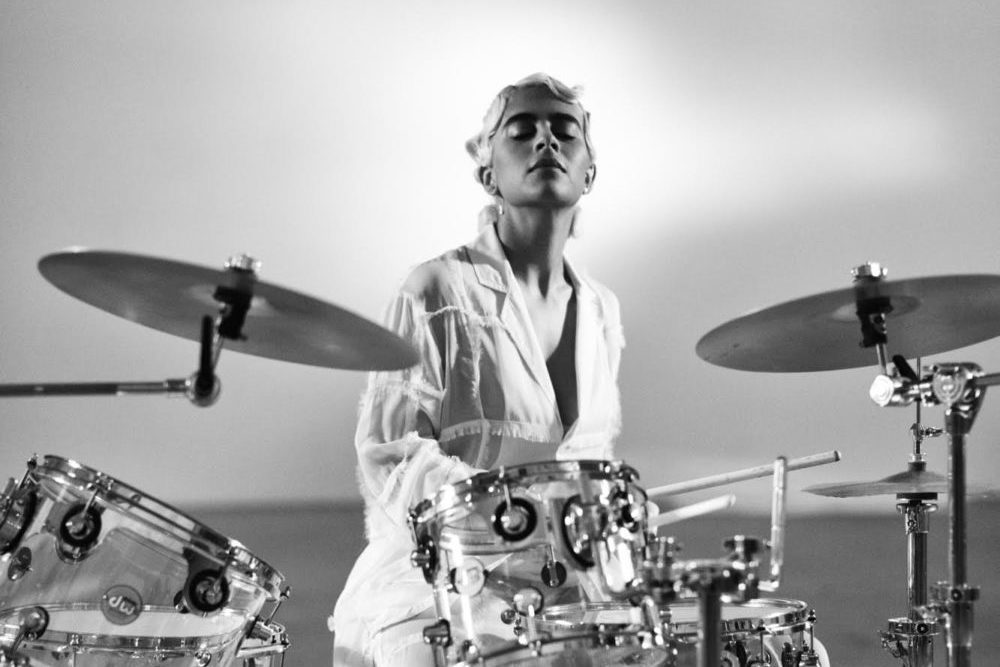

Trigger Warning: This editorial contains graphic discussions about suicide and mental health
Jetty Bones pushes the literal boundaries of her work on latest album Push Back, swapping out indie/rock singer/songwriter sensibilities for dazzling dance-centered pop music. Beneath those shimmering, warm, and inviting musical layers, Jetty Bones (real name Kelc Galluzzo) lays her heart and soul bare with regard to her own ongoing journey with depression and suicide. The singer-songwriter has been pretty honest about her experiences online, but these eleven songs showcase, with a scalpel’s merciless edge, a slow mental unraveling and eventual blow-out. It’s one I know all too well.
On “Dolly,” Jetty Bones sings, “Oh, I often want to off myself, but I don’t quite wanna die,” a prickly feeling that’s lingered in my brain since suicidal ideation first slipped around my throat in the summer of 2003. Nothing in particular triggered suffocating thoughts of death; they were just there. One night, I gobbled a whole bottle of Tylenol, and the only thing I achieved was a belly full of black bile. I puked for 24 hours straight and told my mom it was nothing but a stomach bug.
That was the first of many suicide attempts in my life. I’ve danced through various stages of darkness ever since, often slithering through existence like a slug on the sidewalk. In my senior year of college, I landed in the hospital and spent a few days in a psych ward 一 and a year later, I came this close to shuffling off this mortal coil. What I remember most about that dreary February night is stumbling blindly down my block in a panic, the Tylenol flooding my brain and clogging my senses; my vision grew blurry, and my head swam, seemingly crashing against reality like waves on a rock-laced coastline. Remorse bubbled up on my skin like pus-filled blisters, as what I’d attempted to do came into focus with the dissipation of the pills sloshing in my belly. I plopped myself down on the curb and grabbed my stomach.
The night ran cool, even the heat from the pavement was dulling into a simmer. The street lamps cast an intoxicating amber in pools around my feet, as my neck fell into a loose, ribbon-y arc. My gaze fell into the crevices underneath the rubber soles of my converse. I didn’t think I had anything left to give, but somehow, I found my body seemingly moments later tumbling headfirst into my futon. My head spiraled for the next 18 hours or so, the daze never fully wearing off until a week later. I’d never been more terrified to die than I was in those moments.
Twelve years later, it feels both like it happened just yesterday and in another lifetime. I never tried to kill myself again after that, yet I still struggle daily with wanting to kill myself but not quite wanting to die. When I assess 2021, I return to Push Back as the only one record that seems to capture the tragedy I feel forced to play and the beauty in rediscovering what it means to be fully alive and breathing.
With the record’s opening lyric, decorated inside a guitar-synth patchwork in “Waking Up Crying,” Galluzzo asks a simple question: “Can we talk about your heart please?” She goes on to sympathize with the listener, expressing how “damn exhausting” it must be to move through the world and feel like such a burden to everyone. Later, “Waking Up Exhausted” picks up the wayward shards and glues them back together. But her determination to be okay again is all for naught; some days, she doesn’t even have the energy to tumble out of bed and stumble to the kitchen for coffee. “I think I might be sick,” she mumbles.
Galluzzo positions Push Back as a hyper-electric, wholly-personal case study in mental health, but moments like “Nothing” and “That’s All” oscillate away from themes of anxiety and depression to examine love and heartbreak, too. Even so, there are lyrics in both these songs, for example, that read as subtle cues to her cracking headspace. “I don’t know if you want me to run/Or if I should be fight-fight-fighting for my life,” she renders in the former. In the latter, she spits over a slinky beat, “I don’t wanna be another let down on that list for you/Do it like you gotta do when times are tough/And it’s killing me, you’re feeling like you’re not enough.”
That’s the thing about mental health. It’s insidious and affects your relationships and friends whether you realize it or not. Most often, you don’t know it’s happening until those tenuous ties fray and shred and fall away from your life completely. Then, you come crashing into a song like “Taking Up Space,” in which Galluzzo supposes she should “get out of the way” to save those around her. “The pulling threads of woes we weave are/ Tangled up intricately/With the passive placement of feelings/That leaves us with no room to breathe,” she reflects in the bridge.
“No room to breathe” stings my ears even now. There is no room to breathe when you’re depressed and anxious. The world feels suffocating and much smaller than it really is. So, you turn to any manner of vices – wine perhaps, or you pick up smoking again – and you gaze out over the “Ravine,” as imagined by Galluzzo in one of the album’s most moving moments. “And shameful as it is to admit/I’m in an existential crisis/But I’ll be fine, just like I always am,” she sings, gazing up off the bathroom floor. The dread and anxiety and depression has clashed inside her brain and thrashes until everything collapses into dust, the world distorts, and you have no other way to go but further down. You spiral into an alcohol-induced stupor, and your life doesn’t seem like your life anymore.
As evidenced with “Bad Time,” a collaboration with Eric Egan, one’s coping mechanism can be sardonic humor. Galluzzo diffuses her existential crisis with 100-second reprieve, dishing up cheekiness (“There’s a demon in my heart, and I named her Linda”) while supplying some sage wisdom. “Sorry you caught me at a bad time/See, I thought tonight I might be dying/Nobody told me you could get up and just try again,” she caterwauls. “I’m not trying to be anxious/But I wish for once you would believe that/I’m not afraid of you, honey/I’m just afraid of everything.”
Galluzzo briskly swerves back into brightly package-wrapped seriousness with “Dolly,” another moment that pricks your skin with syrupy deception. Its country framework is jolly, a Friday night hoedown at the local dance hall, distracting you from the lyrics that hint at inner turmoil that’s now bloomed into an inextinguishable wildfire. “I’ve been drowning in the depths, so far gone and so dark/That nobody can save me,” she laments, later admitting that she’s “better off dead or living on the lam.”
There’s one stanza that sums up many things for me:
“I don’t mean to sound impatient
Or hollow and insincere
But I’ve got postcards in my kitchen saying, ‘l wish you were here’
I’m stubborn and ungrateful with the people in my life
Oh, I often want to off myself, but I don’t quite wanna die”
That brings things full circle. “Oh, I often want to off myself, but I don’t quite wanna die” reads as much as a eulogy as it does a dare to live again. This past year, I’ve felt this lyric more than any other. It’s hard to drag yourself out of bed when the pressures of not only the modern world but your own mind press down upon your shoulder blades. The days I spent wallowing in bed and postponing deadlines just so I could breathe again feel like too many to count.
With its haunting vocal structure and palpitating guitar line, operating almost heart-like, “Bug Life” bowls right over you and challenges what I even thought about dying. It’s the finale to end all other finales. “You were a wreck, and they wouldn’t let you in/‘Cause you were a dirty mess/And they don’t want it on their carpet,” she describes the mental tug-of-war. “So you felt like a bug, that everyone wanted to squish/But you wouldn’t give this up/No, you won’t give this up.”
But she did almost give it up. In exchange for a traditional bridge, Galluzzo supplies real voicemails loved ones left her, as well as one she herself left. “I just wanted to say that I’m sorry,” she can be heard, her voice cracking with emotion. In four minutes, “Bug Life” manages to encompass one’s entire existence and the burning out, when you reach the threshold and see yourself never turning back. I came close to never turning back, but I did. And she did. And for that I’m forever thankful.
Earlier this year, I had the joy to speak with Galluzzo about the record’s inception and how putting “Bug Life,” specifically, out into the world is not “an act of bravery or me trying to be inspirational by any means,” she said. “It’s me wanting to show people where I am actually coming from—to help eliminate the idea that I have it all figured out. I’m still human and dealing with this. Depression and suicidal thoughts are part of the mental health issues that I’ll probably deal with for the rest of my life. I shouldn’t be on a pedestal for my recovery.”
And she’s absolutely right. It’s not an act of bravery to share her story; it’s just a piece to the puzzle of who she is. I’ve chosen to be transparent in my journey, as well, with the hope that a queer kid in middle America can see and know they are not alone in their feelings. As cliché as it sounds, things really do get better. Jetty Bones’ Push Back is testament to that.
Despite how bad things can get, and they were awful this year, I am so glad I stayed.
If you or someone you know is considering suicide, please contact the National Suicide Prevention Lifeline at 1-800-273-TALK (8255), text “STRENGTH” to the Crisis Text Line at 741-741 or go to suicidepreventionlifeline.org.
Follow Jetty Bones on Twitter and Instagram for ongoing updates.




